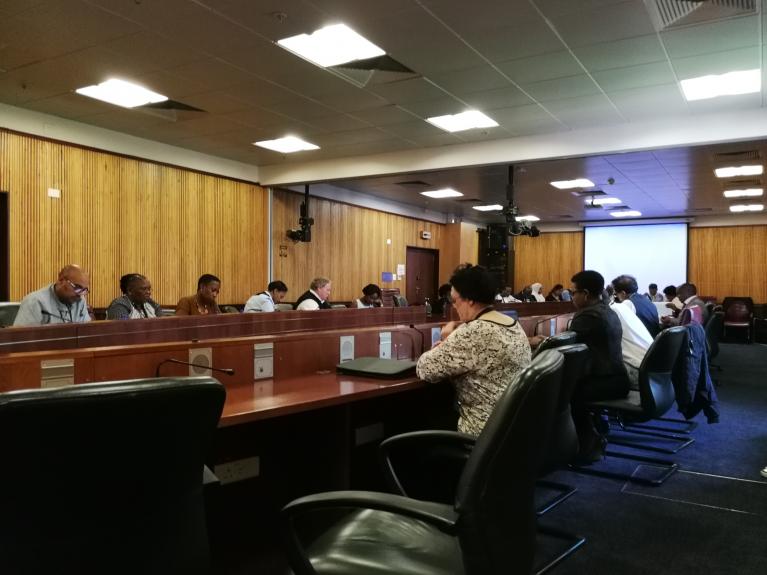Latest Resources

4 October 2018
GM0 ALERT: news and status quo in South Africa
As part of the African Centre for Biodiversity (ACB)’s monitoring and resistance of GMO activities in SA, we share with you, our latest GMO Alert. In this alert we highlight the following issues concerning GMOs in South Africa: General release of the Monsanto/Water Efficient Maize for Africa (WEMA) GM drought tolerant maize on hold as […]

31 May 2018
Parliamentary consultation & decision making on SA’s Corporate Seed Bills a Sham!!
The African Centre for Biodiversity (ACB) is deeply concerned that South Africa’s draconian corporate seed Bills were approved by the Parliamentary Select Committee on the 22nd May 2018, with no substantial changes being made. This despite a number of provinces having rejected the Bills entirely on the basis that they did not adequately serve the […]

15 March 2018
Objection to Application by Dow for general release of GM maize: MON89034 X TC1507 x NK603 with t...
The ACB has played an essential watch-dog role on new GMO permits in South Africa for a decade now, adding substantially to the discourse about the scientific assessment of GMOs as well as about issues of socioeconomic impacts and democratic decisionmaking, through lodging substantive comments on at least 30 permit applications. We are objecting to […]

8 February 2018
Monsanto’s risky triple herbicide-tolerant soybeans to enter South Africa’s food systems
ACB warns that the South African government has received an application for the commodity clearance (import for food, feed and processing) of ‘triple-stacked variety of genetically modified (GM) soya – MON 87708 X MON 89788 X A5547-127 by Monsanto South Africa (Pty) Ltd in October 2017. This GM Soybean variety represent has been genetically engineered […]

31 January 2018
ACB’s Objection to Monsanto’s Application for Commodity Clearance of MON 87708 × MON 89788 × A554...
ACB is objecting to the commodity clearance of the triple-stacked GM soybean event MON 87708 x MON 89788 x A5547-127, due to concerns surrounding the lack of safety assessment data for this crop and the known toxicity of the three pesticides it is designed to tolerate. Its tolerance to three pesticides, glyphosate, glufosinate and dicamba […]

26 September 2017
Frequently asked questions about the WEMA project
The ACB and TWN have put together a short Frequently Asked Questions (FAQs) about the Water Efficient Maize for Africa (WEMA) Project.

23 August 2017
OPEN LETTER TO AFRICAN BIOSAFETY REGULATORS
OPEN LETTER TO AFRICAN BIOSAFETY REGULATORS Do not allow Africans to be used as guinea pigs for untested high-risk new GM technology The Alliance for Food Sovereignty in Africa calls for an immediate ban on the importation into South Africa of Monsanto’s high-risk second-generation gene-silencing genetically modified (GM) maize destined for human consumption. AFSA rejects […]

10 August 2017
RNA interference GMOs to enter South Africa and Nigeria
In this alert, the ACB warns that the South African government received an application for the commodity clearance (import for food, feed and processing) of a ‘multi-stacked variety’ of genetically modified (GM) maize – MON87427 × MON89034 × MIR162 × MON87411, which represents the entry of the second generation of genetically modified organisms (GMOs) in […]

31 July 2017
The Water Efficient Maize for Africa (WEMA) project: Real or false solution to climate change?
By Lim Li Ching, Senior Researcher, Third World Network Climate change is an urgent challenge facing farmers in Africa. As our world warms, many farmers are already experiencing devastating consequences, including storms, drought, floods, heat waves and extreme weather events. The implications for food security are severe, with the Intergovernmental Panel on Climate Change (IPCC) […]

31 July 2017
No Safe Limits for Toxic Pesticides in Our Foods
On 7 April 7 2017 the South African government issued draft amendments to its regulations governing the legal limits for pesticide residues on food crops. The proposed amendments expose the gaps in regulations to date, despite the cultivation of herbicide-tolerant GM crops for almost two decades. As the African Centre for Biodiversity (ACB) team researched […]
